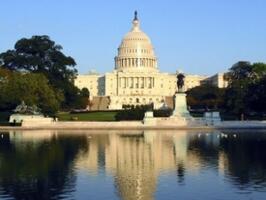50% Oppose Health Care Law’s Individual Mandate, 36% Favor
One-out-of-two U.S. voters continues to oppose the national health care law’s requirement that every American have health insurance. Most also still don’t know if their state has a health care exchange even though those exchanges are scheduled to start signing up insurance applicants beginning tomorrow.
Thirty-six percent (36%) of Likely U.S. Voters believe the government should require every American to buy or obtain health insurance, according to the latest Rasmussen Reports national telephone survey. Fifty percent (50%) disagree and oppose the so-called individual mandate. Fourteen percent (14%) are undecided. (To see survey question wording, click here.)
Support for the individual mandate is unchanged from early July, but opposition is down six points from 56%. At that time, voters by better than a two-to-one margin, 56% to 26%, wanted the president to delay implementation of the mandate.
With a federal government shutdown looming tonight at midnight, House Republicans are proposing a short-term budget that would delay the individual mandate a year, but Senate Democrats are unlikely to agree. In surveying earlier this month, 56% of voters agreed a shutdown would be bad for the economy, but 51% were willing to risk a shutdown until Democrats and Republicans agree on what spending for the health care law to cut. Rasmussen Reports will release new numbers on the shutdown at 10:30 am Eastern today.
Forty-seven percent (47%) of voters say they know whether their state has agreed to set up a health care exchange. Twenty-six percent (26%) admit they do not know, and another 28% are not sure.
Awareness is up from 32% in January but has increased only slightly from 45% early this month.
Special offer : A Rasmussen Reader subscription that lasts through December 31, 2014 is now just $24.95. Sign up today!
(Want a free daily e-mail update? If it's in the news, it's in our polls). Rasmussen Reports updates are also available on Twitter or Facebook.
The survey of 1,000 Likely Voters was conducted on September 28-29, 2013 by Rasmussen Reports. The margin of sampling error is +/- 3 percentage points with a 95% level of confidence. Field work for all Rasmussen Reports surveys is conducted by Pulse Opinion Research, LLC. See methodology.
Under the health care law, the exchanges are intended as a vehicle through which uninsured individuals can buy federal government-standardized health insurance plans, in many cases partially paid for by government subsidies. The exchanges are scheduled to begin accepting customers tomorrow. Sixteen states and the District of Columbia have decided to establish their own insurance exchanges, while seven states will operate one in partnership with the federal government. Twenty-seven states have chosen not to create exchanges and will have their residents rely on one run by the federal government.
Also under the law, uninsured Americas are required to have health insurance by January 1, and failure to do so could result in sizable penalties.
Fifty-nine percent (59%) of Democrats support the individual mandate; 78% of Republicans and 54% of voters not affiliated with either of the major parties oppose it.
Middle-aged voters are more supportive of the individual mandate than those under 40 and senior citizens are.
Fifty-two percent (52%) of black voters agree that the government should require every American to buy or obtain health insurance. Fifty-five percent (55%) of whites and a plurality (46%) of other minority voters oppose that mandate.
Voters who support the individual mandate are much more aware whether their state has established a health care exchange than are those who oppose the mandate.
Thirty-nine percent (39%) of all voters support a single-payer health care system where the federal government provides coverage for everyone. Forty-four percent (44%) oppose such a system, down five points from early this month and the lowest level of opposition this year. Seventeen percent (17%) are not sure.
Sixty-four percent (64%) of Democrats favor a government-run universal health care system. Seventy-eight percent (78%) of GOP voters and unaffiliateds by a 44% to 38% margin are opposed to a single-payer system.
Eighty-five percent (85%) of voters nationwide have been following recent news stories about implementation of the health care law, with 44% who are following Very Closely. Voters over 40 are following the news much more intently than younger voters are.
The health care law provides subsidies for low-income Americans who don’t have access to health insurance from their employer, and 86% think these individuals should be forced to prove they are eligible by documenting their income and their lack of access to insurance. Only eight percent (8%) agree with the Obama administration’s decision to waive documented proof that all applicants are giving honest information.
Most voters still don't like the health care law, and 54% expect it to increase, not reduce, health care costs. From the beginning of the debate over the law four years ago, voters have consistently said that cost is their number one health care concern.
Thirty percent (30%) believe the nation’s health care system will get better under the new law, the most positive assessment to date. Fifty-one percent (51%) still think the law will make the health care system worse.
Voters favor more strongly than ever government-mandated guidelines for health insurance coverage as long as individuals still can decide how much coverage they want to buy.
Health care ranks second only to the economy in terms of importance to voters going into next fall’s congressional elections. Voters remain evenly divided over which political party they trust more to handle health care issues.
Additional information from this survey and a full demographic breakdown are available to Platinum Members only.
Please sign up for the Rasmussen Reports daily e-mail update (it’s free) or follow us on Twitter or Facebook. Let us keep you up to date with the latest public opinion news.
The survey of 1,000 Likely Voters was conducted on September 28-29, 2013 by Rasmussen Reports. The margin of sampling error is +/- 3 percentage points with a 95% level of confidence. Field work for all Rasmussen Reports surveys is conducted by Pulse Opinion Research, LLC. See methodology.
Rasmussen Reports is a media company specializing in the collection, publication and distribution of public opinion information.
We conduct public opinion polls on a variety of topics to inform our audience on events in the news and other topics of interest. To ensure editorial control and independence, we pay for the polls ourselves and generate revenue through the sale of subscriptions, sponsorships, and advertising. Nightly polling on politics, business and lifestyle topics provides the content to update the Rasmussen Reports web site many times each day. If it's in the news, it's in our polls. Additionally, the data drives a daily update newsletter and various media outlets across the country.
Some information, including the Rasmussen Reports daily Presidential Tracking Poll and commentaries are available for free to the general public. Subscriptions are available for $4.95 a month or 34.95 a year that provide subscribers with exclusive access to more than 20 stories per week on upcoming elections, consumer confidence, and issues that affect us all. For those who are really into the numbers, Platinum Members can review demographic crosstabs and a full history of our data.
To learn more about our methodology, click here.





